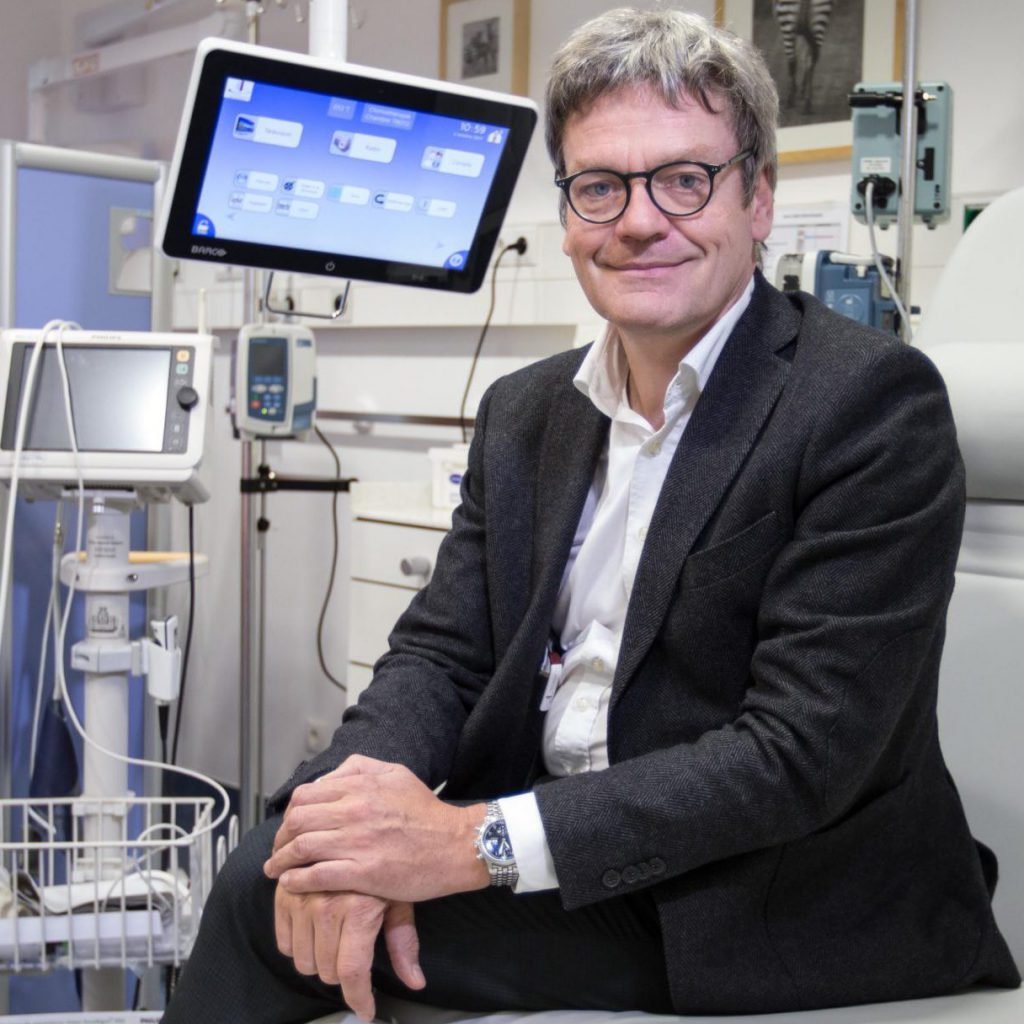The Huntsman at Home trial of adult oncology patients began at the University of Utah Huntsman Cancer Institute in 2018. Nurse practitioners and registered nurse teams deliver care directly at the homes of patients with acute needs following hospitalization, those who have unstable symptoms that require urgent evaluation, or those with disease progression that would otherwise require a trip to the emergency department (ED). Backup support is provided by medical oncologists and palliative care teams.
Kathi Mooney, PhD, RN, of the University of Utah Huntsman Cancer Institute, said addressing patients’ acute care needs at home is especially relevant during the COVID-19 pandemic as patients try to limit hospital admissions and ED visits to reduce their exposure to the disease. She said the hospital-at-home concept is poised for “disruptive innovation and evaluation of new models of care” in the United States.
During the first 14 months of Huntsman at Home, the authors reported on 367 patients, of whom 169 were in the Huntsman at Home group and 198 were in the usual care comparison group. Patients in the usual care group were clinically qualified for Huntsman at Home admission but lived outside the service area. The study used an intent-to-treat analysis with propensity weighting to address this pragmatic evaluation that did not include random assignment.
The patients had an average age of 62, 84.7% were white, and 77% had stage IV cancer. The most common malignancies were gastrointestinal, gynecologic, genitourinary, and lung cancers. Compared with the usual care group, the Huntsman at Home patients were more likely to be female and showed a trend toward longer length of stay for a hospitalization during the month prior to admission.
The key findings 30 days after enrollment included a 58% odds reduction in unplanned hospitalizations, a mean odds reduction of 1.19 days in unplanned hospital length of stay, 48% odds reduction in ED visits, and 48% reduction in cumulative costs compared with the usual care group ($10,238 vs. $21,363, respectively).
“Our evaluation demonstrated robust reductions in health care utilization and cost,” Dr. Mooney said. “This was an initial test in a concept in oncology and shows that extending acute-level cancer care into homes and communities of cancer patients—utilizing a hospital-at-home model—can significantly improve patient experience and outcomes.”
The discussant for this abstract was Lynne I. Wagner, PhD, of the Wake Forest School of Medicine and Wake Forest Baptist Comprehensive Cancer Center. She noted the timeliness of the Huntsman model in the era of COVID-19 for acute care at home.
“These results support this model as a promising direction for high-quality, cost-efficient care, which reduces interactions with the health care environment, reducing the risk for COVID-related outcomes,” Dr. Wagner said. She added that costs associated with COVID-19 infections should be estimated to realize the full economic value of this care model given the significant reductions of exposure to the disease afforded by home-based visits.
Dr. Wagner noted the investigators’ concerns over the lack of a payment model as a significant challenge to sustainability, suggesting that capturing these cost metrics and continuing to validate this care model during the Centers for Medicare & Medicaid Services’ current waiver of certification of homebound status will move the needle in adopting more innovative patient-centered models of care.
- Mooney K, et al. ASCO Virtual Meeting, 29-31 May 2020, Abstract 7000.
Posted on
Previous Article
« Nurse-led telephone triage system reduces hospitalizations, helps patients manage symptoms at home Next Article
Thoracic cancers versus COVID-19 »
« Nurse-led telephone triage system reduces hospitalizations, helps patients manage symptoms at home Next Article
Thoracic cancers versus COVID-19 »
Table of Contents: ASCO 2020
Featured articles
COVID-19 & Telemedicine
COVID-19 and Cancer Consortium Registry: initial results
Oncology hospital-at-home model reduces hospitalizations, emergency department visits, and costs
Nurse-led telephone triage system reduces hospitalizations, helps patients manage symptoms at home
Melanoma
Adjuvant pembrolizumab: durable RFS for stage III melanoma
Adjuvant pembrolizumab: durable RFS for stage III melanoma
Pembrolizumab plus low-dose ipilimumab well tolerated after progression on PD1 antibody therapy
Toripalimab plus axitinib effective in metastatic mucosal melanoma
Breast & Ovarian Cancer
Advanced breast cancer: locoregional therapy does not improve OS
T-DM1 does not improve safety or efficacy in HER-2 positive early breast cancer; favorable iDFS reported
Maintenance olaparib improves OS in relapsed ovarian cancer with BRCA1/2 mutation
Combination pembrolizumab/chemo improves PFS in metastatic TNBC
Effect of veliparib with or without cisplatin in breast cancer: results of SWOG S1416
PHOEBE, a phase 3 trial comparing pyrotinib and lapatinib in HER2-positive metastatic breast cancer
BYLieve demonstrates efficacy of PIK3CA-directed treatment post CDK4/6-ihibition
Strategies emerge for chemotherapy de-escalation in HER2-positive breast cancer
Multiple Myeloma
Carfilzomib: no PFS benefit for multiple myeloma
Lung Cancer
ES-SCLC: tremelimumab + durvalumab + chemotherapy misses endpoint
Adjuvant osimertinib in NSCLC: practice changing ADAURA trial
ES-SCLC: pembrolizumab KEYNOTE-604 data
Second-line gemcitabine plus ramucirumab significantly improves overall survival
Tiragolumab and atezolizumab: ORR in NSCLC
MET-amplified advanced NSCLC responds well to MET inhibitor capmatinib
Genitourinary Cancer
Urothelial cancer: avelumab works as maintenance therapy
ARAMIS final OS and nmCRPC safety outcomes
Final survival results from phase 3 SPARTAN trial
Novel drug for kidney cancers/VHL patients
Primary analysis from IMvigor010, adjuvant atezolizumab in high risk muscle-invasive urothelial carcinoma
First randomised trial of Lu-PSMA in mCRPC progressing after docetaxel
Gastrointestinal Cancer
HER2-expressing metastatic colorectal cancer: trastuzumab deruxtecan
REGOMUNE: a phase 2 study combining regorafenib and avelumab
Cardiotoxicity: consider switching to S-1
Perioperative chemotherapy for resectable pancreatic ductal adenocarcinoma
Real-world data of sequential sorafenib followed by regorafenib in unresectable HCC
Paediatric Cancer
Sustained improvements in quality of life with larotrectinib
Promising first immunotherapy trial in placental trophoblastic tumours
Precision medicine for poor-prognosis paediatric patients
Related Articles

September 17, 2020
Letter from the Editor
September 17, 2020
Perioperative chemotherapy for resectable pancreatic ductal adenocarcinoma
© 2024 Medicom Medical Publishers. All rights reserved. Terms and Conditions | Privacy Policy
HEAD OFFICE
Laarderhoogtweg 25
1101 EB Amsterdam
The Netherlands
T: +31 85 4012 560
E: publishers@medicom-publishers.com

